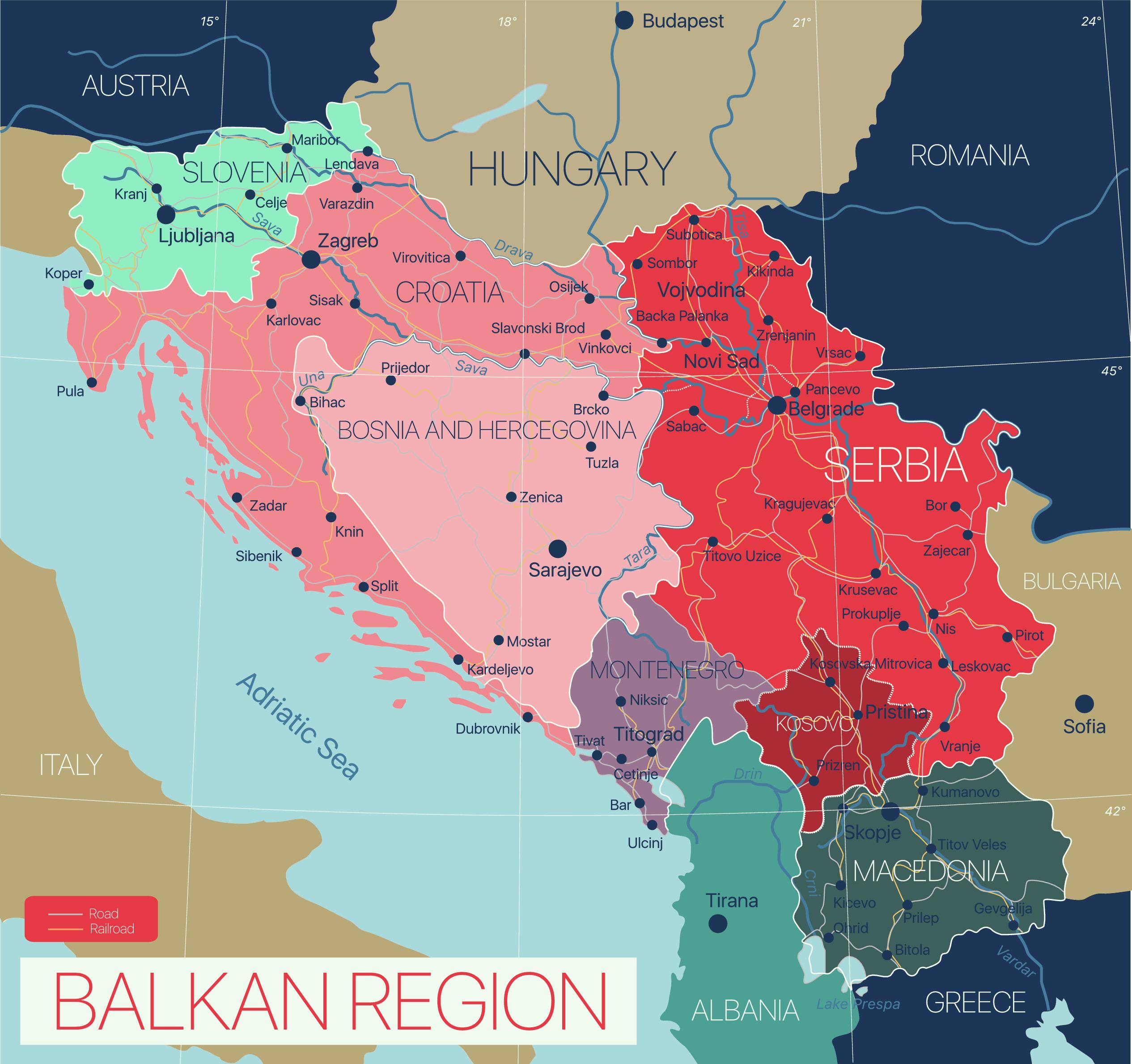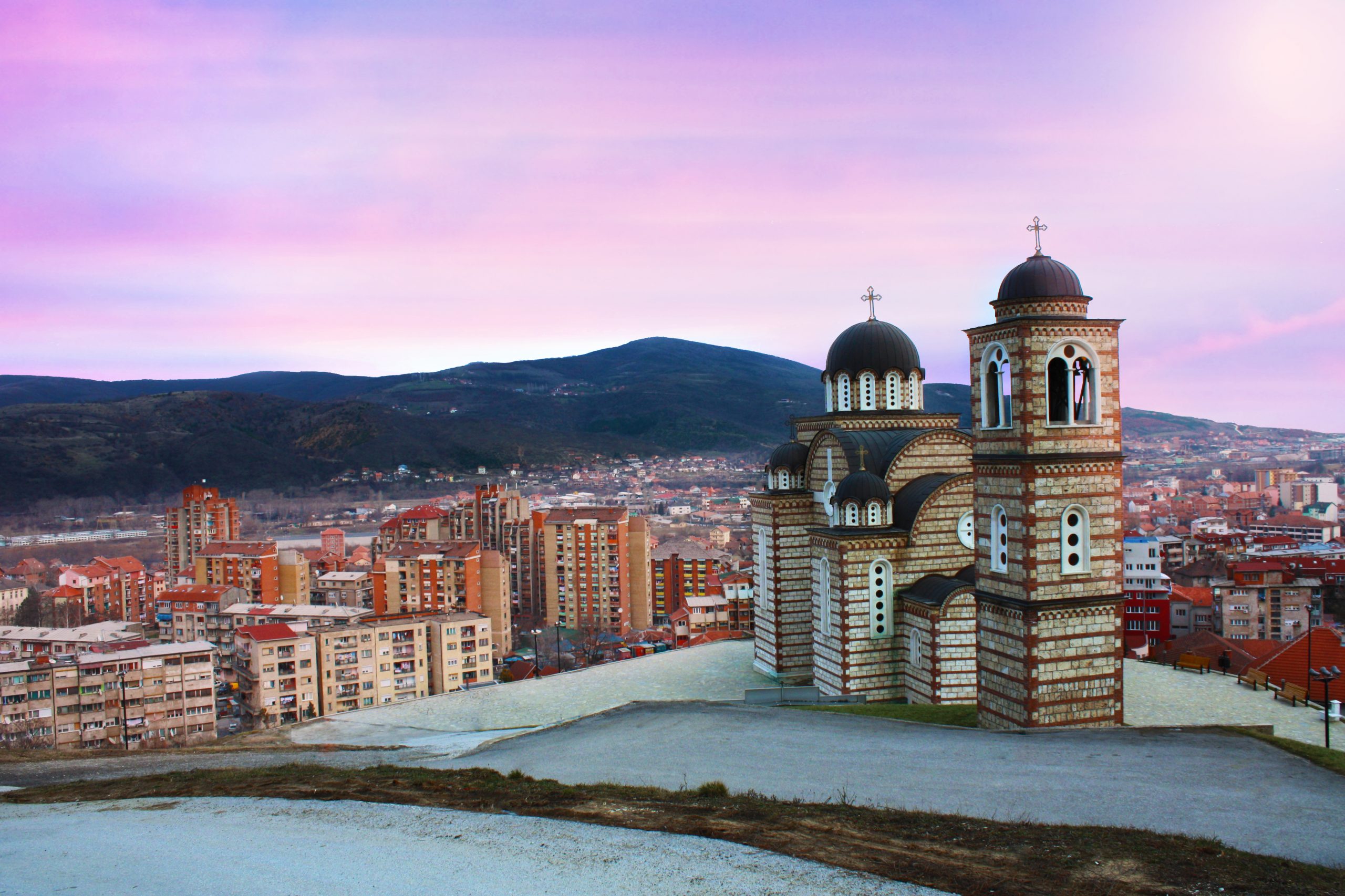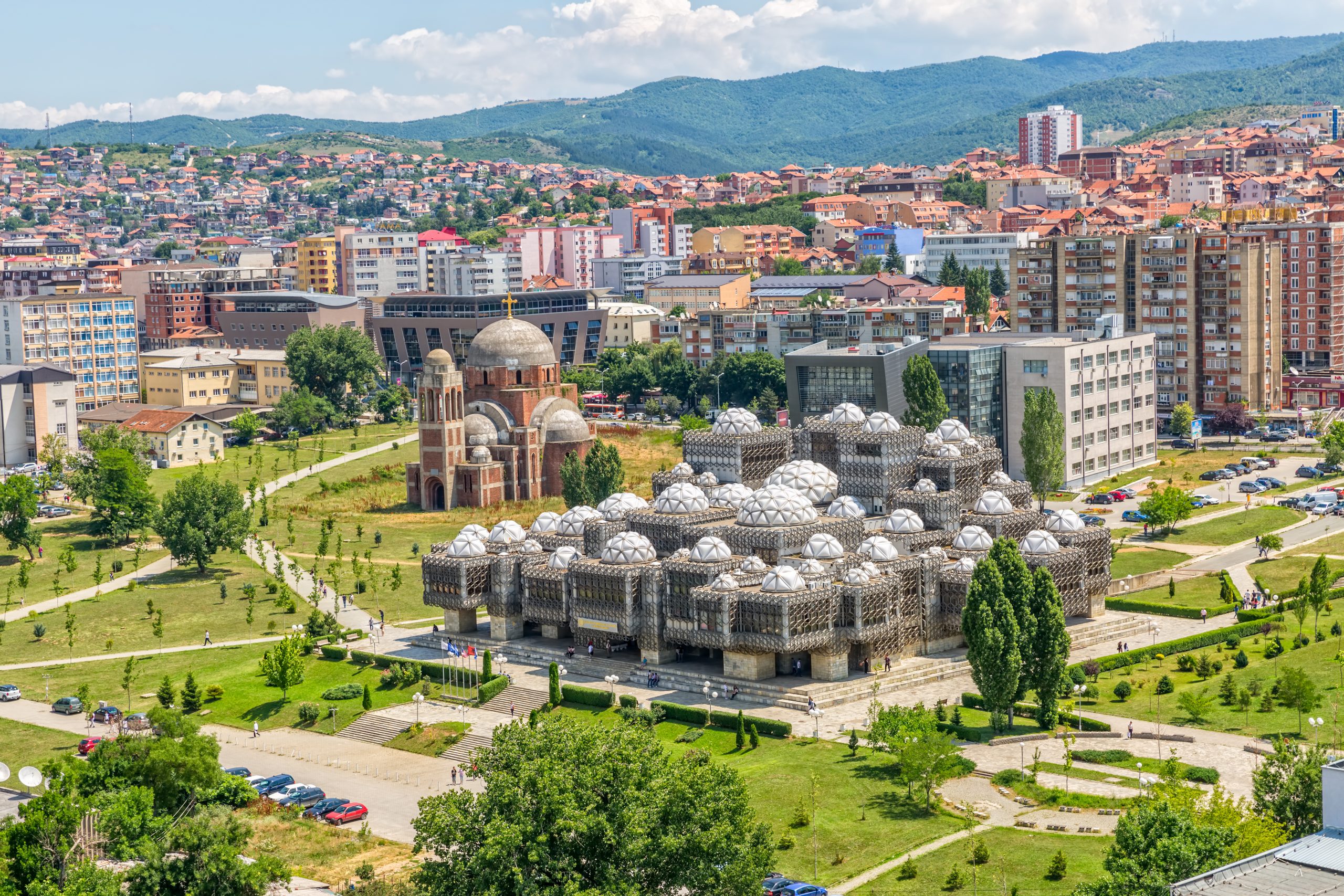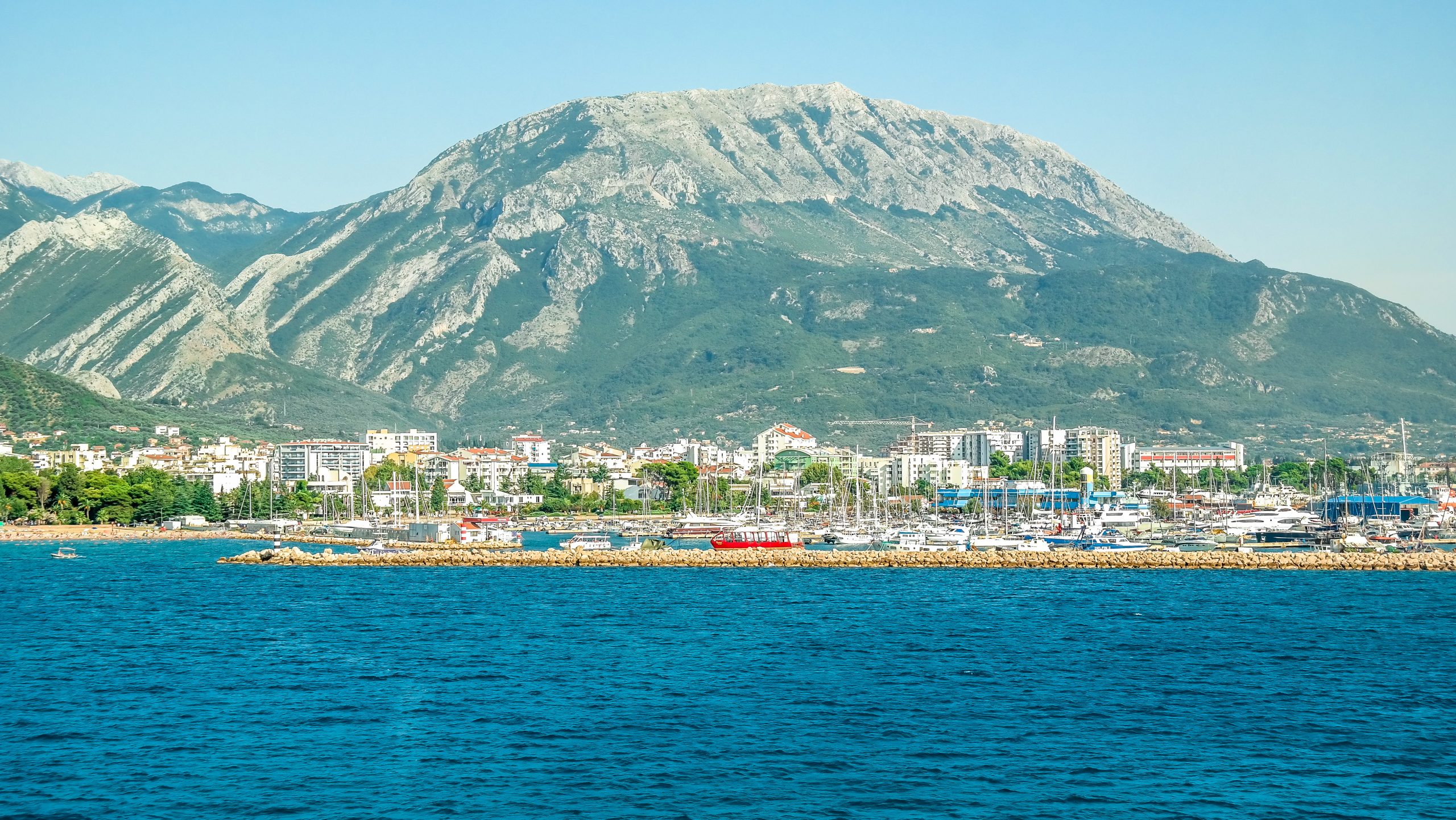Strategic Analysis Balkan Brief
Review of October 2022
Petra Bošková, Lýdia Chobotová, Ivan Iliev, Jakub Kužel, Chiara Mihalčatinová, Adam Németh

Map of the Balkan region; Graphics: Olinchuk/Shutterstock
Albania
The Parliament did not approve the declassification of Communist-era secret files
On October 21, the proposal of making all confidential files of the Communist secret police Sigurimi accessible to the public was discussed. Former Sigurimi data would be released, except for situations involving national security or ties between Albania and other countries. After the proposal was approved by the parliamentary legal affairs committee earlier this month, it was sent to the Parliament. The opinions on the extent of publication of the files differed among political parties, leading to various amendments being introduced in the Parliament.
However, Socialist MPs rejected an amendment that would have required every public entity to publish a list of all Sigurimi documents and to grant everyone the right to obtain copies of these records upon request. Due to the parliamentary majority of the Socialist Party, their bill was the only one to be approved in the end. The approved legislation change will only allow for repeating background checks of officials allegedly collaborating with the Sigurimi since the current law prohibits vetting officials twice.
The opposition sees the approved changes as the attempt of the Socialists to divert attention away from corruption scandals. They also claim that the approved legislative change is meant to target and discredit the former president Ilir Meta, who, after leaving office earlier this year, returned to politics with his rebranded Freedom Party. In this light, Meta has been accused by pro-government media and indirectly by the government of being a former secret police informer. In addition, he allegedly cooperated with Sigurimi in the case of his former roommate, who ended up in prison after his intentions to leave the country were shared with Sigurimi.
Meta underwent a background check regarding possible relations with Sigurimi in the late 1990s. Nevertheless, there is a general belief in the society that the background checks conducted during Albania’s democratic transition were inadequate and allowed former Sigurimi collaborators to keep holding various offices. With the background checks on possible ties with Sigurimi being able to be done again, the question of Meta’s involvement with the secret police is probably yet to be reviewed.
Sources:
- Erebara Gjergj, Balkan Insight, “‘Secret Police Informer’ Claims Spark Political Bust-Up in Albania’” https://balkaninsight.com/2022/08/02/secret-police-informer-claims-spark-political-bust-up-in- albania/
- Erebara Gjergj, Balkan Insight, “Albanian Ruling Party Blocks Public Access to Communist Files” https://balkaninsight.com/2022/10/21/albania-socialists-close-the-door-for-opening-of-the-sig urimi-files/
- Sinoruka Fjori, Balkan Insight, “Albania Moves Towards Declassifying Communist-Era Security Files” https://balkaninsight.com/2022/10/10/albania-moves-towards-declassifying-communist-era-s ecurity-files/

Scenic view of St. Demetrius Serbian Orthodox Church. Photo: kkphotography2/Shutterstock.com
Bosnia and Herzegovina
The recount confirms the victory of Milorad Dodik as the new president of Republika Srpska
General elections held on October 2 in Bosnia and Herzegovina, brought victory to the Bosnian Serb politician, Milorad Dodik. With 48% and a margin of 30,000 votes, he defeated opposition nominee Jelena Trivič and became the president of the Bosnian federal entity, Republika Srpska. However, the opposition described this election result as falsified and called for a recount by the Central Electoral Commission (CEC) of Bosnia and Herzegovina.
Consequently, on October 10, 2022, the CEC ordered a complete recount of the 645 000 votes, referring in its decision to the numerous uncertainties linked to the conduct of the elections. In addition, the opposition parties, the Party of Democratic Progress, the Serb Democratic Party, and the List for Justice and Order, filed criminal complaints with the State Prosecutor’s Office on October 18, accusing Milorad Dodik and 180 other entities of committing electoral fraud. In this timeframe, the opposition even organized two protest rallies in Banja Luka, attended by thousands of people calling for an investigation into the alleged electoral fraud.
Milorad Dodik and his supporters reactively organized their protest on October 25, entitled ‚The motherland is calling,‘ which featured a strong statement from the outgoing President, Zeljko Cvijanovic, to the Central Electoral Commission, „50,000 people have gathered here [in Banja Luka], and 100,000 will come to their doors „. Dodik assured the crowd that he was not going anywhere and would soon be seated in the presidential palace.
On October 27, the results of the ballot recount were announced, confirming the victory of the leader of the Alliance of Independent Social Democrats, Milorad Dodik. However, the Central Election Commission itself acknowledged the existence of numerous uncertainties associated with the October elections but, on the other hand, did not give them higher credibility that could have overturned the result.
Ultimately, the process of recounting the votes led to the confirmation of the initial result. Still, to date (31.10.), the final elections figures are unknown, so the opposition still has room to question the electoral process in the country. Moreover, the realities of these elections have a negative impact beyond the borders of the country, which may be reflected in the Europeanisation process itself, especially if we take into account only the recent offer of the prospect of candidate status outlined in the annual report on Western Balkan states‘ progress towards EU membership.
Sources:
- Al Jazeera and News Agencies, ,,Bosnia’s Dodik declared winner in disputed election after recount”, https://www.aljazeera.com/news/2022/10/27/bosnias-dodik-declared-winner-in-disputed-election-officials
- Kurtic Azem, Balkan Insight, ,,Republika Srpska Opposition Files ‘Election Fraud’ Criminal Complaints“, https://balkaninsight.com/2022/10/18/republika-srpska-opposition-files-election-fraud-criminal-complaints/
- Kurtic Azem, Balkan Insight, ,,Bosnian Serb Strongman Holds Rally Against Election Recount”,https://balkaninsight.com/2022/10/25/bosnian-serb-strongman-holds-rally-against-election-recount/
Croatia
The European Parliament demonstrates its support for Croatia’s entry into Schengen
On October 25, The Committee for Civil Liberties, Justice and Home Affairs (LIBE) voted on whether Croatia meets the necessary criteria to join Schengen. The election result brought overwhelming support for Croatia’s integration initiative. In numerical terms, the vote was 45 in favour, eight against, and five abstentions.
Although the European integration bloc leaders approved Croatia’s entry into Schengen last December, the formalization of the process has not yet been finalized. Taking this into account, the vote, which took place in Brussels at the end of October, brought Croatia one step closer to completing the process and thus to its integration into the passport-free zone.
The vote’s positive outcome in LIBE serves as an essential boost not only for Croatia but also for other EU members in light of the recent allegations that have emerged. The Balkan state has been accused of perpetrating indiscriminate violence against migrants to prove its ability to protect EU borders. Croatia’s very membership thus became the target of criticism for a while. However, the legitimacy of the complaint was called into question by the positive outcome of the vote in the Committee. Moreover, the EU vote demonstrated the consistency of support for Croatia’s membership of Schengen.
The next step associated with Schengen accession is the vote in the EP scheduled for November 9. Despite the decision of the European Parliament having only advisory nature, its outcome will be presented to the Council of the EU, which will then take the final verdict. It is important to note that although the Council’s decision is not time-bound, the Czech Republic, as the current presiding state, has promised to formalize the process by the end of its mandate.
Sources:
- Thomas Mark, The Dubrovnik Times, ,,European Parliament overwhelmingly supports Croatia’s entry into Schengen”, https://www.thedubrovniktimes.com/news/croatia/item/14110-european-parliament-overwhelmingly-supports-croatia-s-entry-into-schengen
- Radosavljevic Zoran, EURACTIV, ,,Croatia meets all Schengen criteria, says EU Parliament rapporteur”, https://www.euractiv.com/section/all/short_news/croatia-meets-all-schengen-criteria-says-eu-parliament-rapporteur/
Kosovo
Normalization of relations between Kosovo and Serbia by the end of 2022?
On October 19, Gabriel Escobar, the US envoy for Western Balkans, spoke to a Pristina-based media outlet, declaring that according to his colleagues involved in the EU facilitated dialogue between Pristina and Belgrade, a potential breakthrough agreement between the countries on the normalization of their relations may be accomplished by the end of the year.
This allegation resurfaced one month after a plan, facilitated by diplomatic envoys from France and Germany, was leaked according to which Serbia would accept Kosovo’s independence but not officially recognize it in return for quick accession to the European Union and financial benefits. The US diplomat expressed that „realistically, in the context of what is going on, everybody needs to step up and create stability not just in Europe but in the region as well. We would like to see Kosovo more aligned on the questions of regional stability, and this is the way they can do it.“
To stress the importance of finalizing the deal’s details, Escobar met with Kosovo’s President and Prime Minister and Serbia’s President and allegedly emphasized the need to take the negotiations facilitated by the EU seriously to achieve peace, stability, and progress in the region. However, a journalist from Kosovo claims that the Prime Minister of Kosovo, Albin Kurti, is reluctant to accept the plan facilitated by France and Germany, as Kosovo views the project as unacceptable – Serbia would still not officially recognize Pristina does not favor the independence of Kosovo and this outcome.
Escobar further hinted Kosovo hopes to reach a deal on its recognition with five EU members that do not recognize Kosovo – Cyprus, Greece, Romania, Slovakia, and Spain. He claims that the distinction between these five countries is significant for Kosovo to be incorporated into international structures and institutions.
Sources:
- Isufi Perparim, Balkan Insight, “Kosovo-Serbia Talks May Advance ‘in Weeks’, US Diplomat Says”,https://balkaninsight.com/2022/10/20/kosovo-serbia-talks-may-advance-in-weeks-us-diplomat-says/
- Radio Free Europe, “U.S. Envoy For Western Balkans Discusses Serbia-Kosovo Normalization With Vucic”, https://www.rferl.org/a/us-envoy-balkans-serbia-kosovo-normalization-vucic/32093012.html
- Taylor Alice, EURACTIV, “Discussions over Kosovo-Serbia intensify, whispers of snap election emerge”, https://www.euractiv.com/section/all/short_news/discussions-over-kosovo-serbia-intensify-whispers-of-snap-election-emerge/

Prishtina, Kosovo. Photo: OPIS/ Shutterstock.com
Montenegro
Djukanovic´s Democratic Party of Socialists suffered major losses in local elections
Local elections in fourteen municipalities, including the capital Podgorica, were held in Montenegro on October 23. The candidates backed up by the parties that formed the first government in the history of Montenegro achieved likely results. Consequently, they will take over the municipality in Podgorica and Pljevlja, Kolasin, Danilovgrad, Zabljak, Zeta, Budva, Tivat, Pluzine and Savnik. On the other side, the Democratic Party of Socialists managed to hold the offices in Bar, Bijelo Polje, Rozaje and Plav.
The Europe Now movement is seen as the winner of the local elections, having the chance to nominate the mayor of Podgorica. This city had been one of the strongholds of the Democratic Party of Socialists for decades. Although Montenegro has twenty-three municipalities, local elections are not held simultaneously in all of them. After the October elections, the Socialists will be in charge of only four. It seems that the party has not undergone a reflection of its 2020 parliamentary defeat, continuing to focus on politics based on divisive topics that bring tensions into society.
The results underline the gradual decline of the Socialists, who, before the 2020 general elections, were indisputably the driving force in Montenegro. However, due to other parties‘ heterogeneous political positions, the President’s party is still relevant on the Montenegrin political scene. The Socialists interpreted the local election results differently, claiming a need for new general election results since they believed the governing coalition had lost its legitimacy.
Experts see the results as an apparent defeat of the Democratic Party of Socialists. However, some claim that they still increase the likelihood of early parliamentary elections in the country, which has been undergoing a deep political crisis stemming from the divide between pro-Montenegrin and pro-Serbian parties. The discrepancies in the position of the Serbian Orthodox Church, the war in Ukraine, the influence of Serbia and Russia, and the skyrocketing inflation and energy costs that worry the whole continent make any political compromise challenging to achieve in Montenegro.
Sources:
- Kajosevic Samir, Balkan Insight, “Djukanovic’s Party Defeat Could Push Montenegro to Early Elections“, https://balkaninsight.com/2022/10/24/djukanovics-partys-defeat-could-push-montenegro-to-e arly-elections/
- Koseva Denitsa, bne Intellinews, “Montenegrin President’s Party Almost Wiped Out in Local Elections” https://www.intellinews.com/montenegrin-president-s-party-almost-wiped-out-in-local-electio ns-260224/

Leaving the Port of Bar, Montenegro. Photo: Colette Moore/ Shutterstock.com
North Macedonia
FRONTEX joins forces with North Macedonia in the fight against illegal migration
On October 13, North Macedonia became another country from the Western Balkans that joined closer cooperation with the European Border and Coast Guard Agency – Frontex.
North Macedonia signed an agreement on border management cooperation with this institution of the European Union during the visit of the President of the European Commission, Ursula von der Leyen, in Skopje. In addition to her, the agreement was signed by the Prime Minister of North Macedonia, Dimitar Kovacevski, and Ylva Johansson, Commissioner for Home Affairs.
The visit to North Macedonia was planned during Ursula von der Leyen’s four-day stay in the Western Balkans. This stay aimed to strengthen the Frontex agency’s cooperation with the Western Balkan countries. Albania, Montenegro, and Serbia signed similar contracts in previous years.
According to EU Home Affairs Commissioner Ylva Johansson, Frontex will be able to deploy permanent border operational teams in North Macedonia to cooperate with border guards and prevent illegal migration. Around 300 members of the EU border guard, who are present in the countries mentioned above of the Western Balkans, have been deployed in the entire operation. Recently, Serbia had to deal with the rising numbers of illegal migrants in the last months. As a result, Serbia had to react by tightening the visa regime for several countries. As a result, since January of this year, the Frontex agency recorded 105,000 illegal border crossings through the so-called Western Balkans route, representing a significant increase compared to 2021, in which 62,000 cases of illegal migration were recorded.
The European Commission allocated 39.2 million euros this year for regional border management. Most of this amount should be used to modernize the equipment, primarily for purchasing drones, surveillance systems, and biometric devices. European Commissioner for Neighbourhood and Enlargement, Oliver Varhelyi, informed about the budget increase by 60% for the period 2021-2024 to at least 350 million euros for the four states.
North Macedonia seems to have taken another step forward in the EU accession process. The President of the European Commission, von der Leyen, also expressed such an opinion. The agreement will have to be approved by the European Parliament and accepted by the Council of the European Union.
Sources:
- DW, „Frontex und Nordmazedonien wollen enger zusammenarbeiten“, https://www.dw.com/de/frontex-und-nordmazedonien-wollen-enger-zusammenarbeiten/a-6356907
- Euronews, „The EU and North Macedonia sign migration agreement”,https://www.euronews.com/my-europe/2022/10/26/the-eu-and-north-macedonia-sign-migration-agreemen
-
European Union, „European Border and Coast Guard Agency (Frontex)“https://european-union.europa.eu/institutions-law-budget/institutions-and-bodies/institutions-and-bodies-profiles/frontex_en
- SchengenVisaInfo, „EU & North Macedonia Sign Agreement for Cooperation Against Irregular Migration”, https://www.schengenvisainfo.com/news/eu-north-macedonia-sign-agreement-for-cooperation-against-irregular-migration/
Serbia
Serbia – EU pressure pushes Serbia to align its visa policies during a migration crisis
In October, tensions arose around migrants illegally entering the European Union through Serbia. This problem in Serbia was caused by its visa-free regimes with some Asian and African countries, allowing the citizens of these countries to enter Serbia legally without any problems and then use smuggling routes or pay people-smugglers to join the EU. Some of the visa-free regimes were issued during the existence of Yugoslavia. However, some were given as Serbia’s gratitude towards the countries that did not recognize Kosovo’s independence.
The EU responded to the rising irregular migration, demanding Serbia align its visa policies with the EU’s by introducing a visa requirement from third countries, to curb the flow of irregular migration into the EU, which has increased in the whole Balkan region by 170 percent in the first nine months of 2022 compared to the same time in 2021.
Furthermore, irregular migration is not the only problem. There have been several reports of fights and shootings among Serbian smuggling gangs, even claims of a connection between the gangs, Serbian police, and security agencies. This connection undermines the work of a particular operational unit, created by the police and Security Intelligence Agency in July, whose goal is to retaliate against the smuggling gangs. Additionally, Serbia was joined by Austria and Hungary in a series of special meetings to resolve the irregular migration issue. As a result, all parties agreed on cooperation and the need to stop the migration.
Moreover, on October 14, the European Commissioner for Home Affairs, Ylva Johansson, stressed that the EU might suspend the visa-free entry of Serbian citizens into the bloc unless Serbia does not align its visa policies with the EU. This pressure was met by Serbia, as President Aleksandar Vučić declared that visa-free entry should be halted by January 2023. However, several days later, Serbia suspended its visa-free policy with Burundi and Tunisia, starting this November.
Sources:
- Dragojlo Sasa, Balkan Insight, “Serbians’ EU Visa-Free Travel Threatened by Migration Policy”, https://balkaninsight.com/2022/10/14/serbians-eu-visa-free-travel-threatened-by-migration-policy
- Dragojlo Sasa, Balkan Insight, “Serbia Ends Visa-Free Regimes with Tunisia and Burundi”, https://balkaninsight.com/2022/10/25/serbia-ends-visa-free-regimes-with-tunisia-and-burundi
- Panić Katarina, Fair Planet, “Serbia to Curb Visa-Free Regime to Curb Migration to EU”, https://www.fairplanet.org/editors-pick/serbia-to-curb-visa-free-regime-to-curb-migration-to-eu/

Contact us